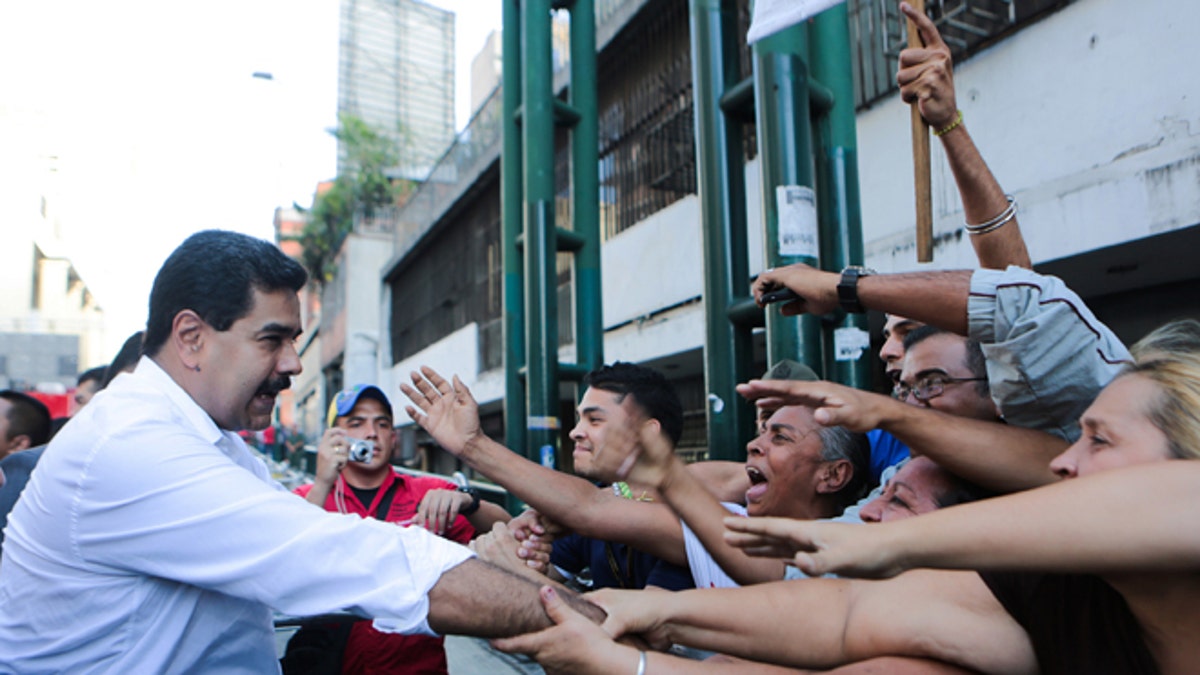
President Maduro during a transport workers rally in Caracas, Venezuela, Tuesday, Nov. 12, 2013. (AP2013)
At first glance, the question "who runs Venezuela?" seems rather odd. We know that the country's president is Nicolás Maduro, who came to power last April in an election that was widely slammed as fraudulent. We also know that Maduro has amassed enormous powers for himself by passing an Enabling Act that will allow him to rule by decree.
At the same time, Maduro enjoys neither the popularity nor the credibility within his party that sustained his predecessor, Hugo Chávez. Since Chávez died last March, shadowy state institutions whose purpose is to sustain chavismo by any means necessary have also been granted unprecedented powers by Maduro's regime.
All authoritarian regimes have their figureheads, but it's very often the case that these individuals are not more powerful than the institutions which underpin them.
At the end of September, Maduro announced the creation of a new intelligence agency. Known in Venezuela by the unwieldy Spanish acronym CESPPA, the agency's formal name is the "Strategic Center for Security and Protection of the Homeland." CESPPA's head is a feared former army general and intelligence chief, Gustavo Gonzalez Lopez.
Significantly, CESPPA reports not to Maduro's office, but to another body which Venezuelans have heard a great deal about, yet whose exact workings remain a mystery – the "Political-Military Directorate of the Bolivarian Revolution.” The Directorate is not, of course, mentioned in the Venezuelan constitution. Nonetheless, Maduro is a member of this body, as is a man long-regarded as his principal rival, the National Assembly Speaker, Diosdado Cabello, along with various generals and intelligence chiefs.
With the arrival of CESPPA on the scene, Venezuelans are likely to get a clearer sense of who really runs their country in the coming months. Needless to say, the portents are not good. Asdrubal Aguiar, a leading Venezuelan human rights advocate, has compared CESPPA to the hated DINA intelligence agency which operated in Chile during General Augusto Pinochet's brutal dictatorship. Meanwhile, media freedom campaigners have pointed out that CESPPA has the power to classify and censor information, despite the provisions to the contrary in the Venezuelan constitution.
- Two Still Missing After Plane On Medical Flight To Mexico Crashes Off Florida Coast
- George Zimmerman Released On Bail; Told To Stay Away From Girlfriend, Guns
- Albuquerque Voters Reject Ban On Late-Term Abortions
- About 40 Percent Of All Tourism To Peru Prompted By Its Renowned Cuisine
- Microsoft Opens Anti-Cybercrime Office In Colombia, Home To 6 Million Victims A Year
- Trash And Sewage Clog Rio De Janeiro’s Olympic Waterways
In this arrangement, no-one – not even Maduro – is safe. All authoritarian regimes have their figureheads, but it's very often the case that these individuals are not more powerful than the institutions which underpin them. Remember how the Soviet intelligence services would purge even the most well-known leaders in the Soviet Union? We could well be on the verge of seeing something similar in Venezuela, where the true authority is not the National Assembly or even the president, but CESPPA and the Directorate it answers to.
It's at this point that the plot really thickens. If Maduro fails as a leader, there is no firm indication as to who will replace him, though the smart money will likely opt for Cabello. Yet even with the support of CESPPA, Cabello may find that his ambitions are frustrated by the influence of Cuba's leaders, whose close relationships with Chávez and Maduro brought them the benefit of an annual oil subsidy worth around $12 billion, and who are angered by Cabello's habit of holding Havana at arm's length.
On the domestic front, there is an even bigger challenge through the plain fact that the regime's policies are no longer economically sustainable – as evidenced by the state-sponsored looting of consumer electronics stores privately owned by the Daka company. Heinz Dieterich, a former Chávez confidante who has compared Cabello to Joseph Stalin, recently stated that the regime's "remaining life can be measured in months."
What can we conclude from all this? That Nicolás Maduro doesn't run Venezuela single-handed, and equally, that chavismo is engaged in a struggle for survival. In contrast to the past, there is no chavista leader capable of emulating the successes Chávez enjoyed.
That's why Venezuelans are dreading a fresh round of political intrigue. The country is immersed in all sorts of rumors. Most of all, they are asking whether the democratic system destroyed by Chávez and his cohorts can ever be restored. That outcome remains possible as long as Venezuelans are willing to cast their votes against the Chavistas whenever they have the opportunity to do so.
Much depends on the outcome of the forthcoming municipal elections on December 8th. Maduro is well aware that the economy is losing him support amongst previously reliable constituencies, like the urban poor. Recent polls suggest that Maduro will win around 41 percent of the vote, while the opposition MUD coalition, headed by Henrique Capriles, is heading for around 48 percent. In a recent interview, Capriles taunted by Maduro by arguing that much as the president would like to suspend the December vote, it's now too late for him to do so.
December 8, therefore, in no ordinary municipal election. Nothing less than a national referendum on the future of Venezuela is at stake.








































